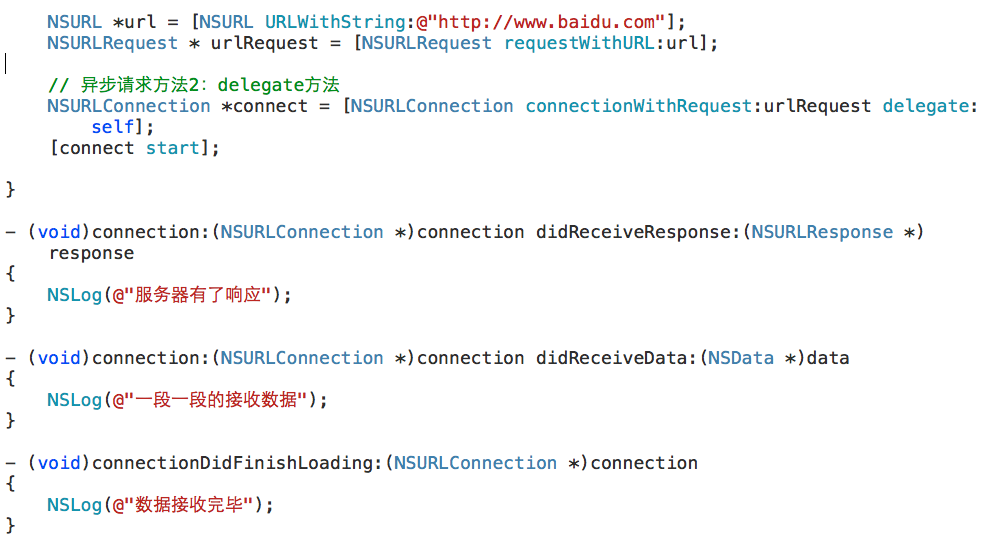QF——网络之网络请求的几种方式,图片缓存
同步请求和异步请求:
同步请求会阻塞主线程;不会开启新的线程,还是主线程,所以直到请求成功后,才能执行其它操作。
异步请求不会阻塞主线程。开启新的线程去请求服务器,而不影响用户的交互操作等其他动作。
使用NSURLConnection发送同步请求和异步请求:
同步请求:

异步请求:(block回调方式)——请求的数据通过block返回

异步请求:(delegate方式)——请求的数据在重写的代理方法里返回

需要注意的是:
- (void)connection:(NSURLConnection *)connection didReceiveData:(NSData *)data
didReceiveData的参数data是从服务器返回的二进制数据,所以我们使用NSMutableData类型来接收。因此,json解析的核心就是把从网络而来的二进制数据(NSData)转换为json对象。然后从json结构获取有意义的数据。
NSDictionary * jsonDict = [NSJSONSerialization JSONObjectWithData:data options:NSJSONReadingMutableContainers error:&error];
补充:网络请求返回的数据一般都是二进制数据(NSData),但若请求是纯文档,则也可以使用NSString接收。
// // ViewController.m // JSONTest // // Created by mac on 15-3-30. // Copyright (c) 2015年 ___FULLUSERNAME___. All rights reserved. // #import "ViewController.h" #import "App.h" #import "UIImageView+WebCache.h" #define kSearchUrl @"https://api.douban.com/v2/book/search?q=s" @interface ViewController ()<UITableViewDataSource,UITableViewDelegate,NSURLConnectionDataDelegate,NSURLConnectionDelegate> { NSMutableArray * appArr; NSMutableData * downloadData; UITableView * tabView; } @end @implementation ViewController - (void)viewDidLoad { [super viewDidLoad]; downloadData = [NSMutableData data]; appArr = [NSMutableArray array]; //新建tableView [self createTableView]; //建立异步请求 [self makeConnection]; } - (void)createTableView { tabView = [[UITableView alloc]initWithFrame:CGRectMake(0, 0, 320, 480) style:UITableViewStyleGrouped]; tabView.delegate = self; tabView.dataSource = self; tabView.rowHeight = 80; [self.view addSubview:tabView]; // [tabView registerClass:[UITableViewCell class] forCellReuseIdentifier:@"cell"]; } - (void)makeConnection { [NSURLConnection connectionWithRequest:[NSURLRequest requestWithURL:[NSURL URLWithString:kSearchUrl]] delegate:self]; } - (void)decodeJson:(NSMutableData *)data { NSError * error; NSDictionary * jsonDict = [NSJSONSerialization JSONObjectWithData:data options:NSJSONReadingMutableContainers error:&error]; NSArray * jsonArr = jsonDict[@"books"]; for(NSDictionary * dict1 in jsonArr) { NSString * large = dict1[@"images"][@"large"]; NSString * title = dict1[@"title"]; NSString * author = dict1[@"author"][0]; App * app = [[App alloc]init]; app.large = large; app.title = title; app.author = author; [appArr addObject:app]; } NSLog(@"%d",appArr.count); } - (NSInteger)tableView:(UITableView *)tableView numberOfRowsInSection:(NSInteger)section { return appArr.count; } - (UITableViewCell *)tableView:(UITableView *)tableView cellForRowAtIndexPath:(NSIndexPath *)indexPath { UITableViewCell * cell = [tableView dequeueReusableCellWithIdentifier:@"cell"]; if(cell==nil) { cell = [[UITableViewCell alloc]initWithStyle:UITableViewCellStyleSubtitle reuseIdentifier:@"cell"]; if(appArr.count>0) { App * app = appArr[indexPath.row]; cell.textLabel.text = app.title; cell.detailTextLabel.text = app.author; [cell.imageView sd_setImageWithURL:[NSURL URLWithString:app.large] placeholderImage:[UIImage imageNamed:@"photo"]]; } } return cell; } - (void)connection:(NSURLConnection *)connection didReceiveResponse:(NSURLResponse *)response { downloadData.length = 0; } - (void)connection:(NSURLConnection *)connection didReceiveData:(NSData *)data { [downloadData appendData:data]; } - (void)connectionDidFinishLoading:(NSURLConnection *)connection { //解析json数据 [self decodeJson:downloadData]; [tabView reloadData]; } - (void)connection:(NSURLConnection *)connection didFailWithError:(NSError *)error { NSLog(@"%@",error); } - (void)didReceiveMemoryWarning { [super didReceiveMemoryWarning]; } @end
使用第三方网络请求框架AFNetworking:
先实例化出一个manager对象,对网络的GET和POST请求都是通过它的方法完成的。
success的block返回值responseObject就是服务器传过来的完整数据。返回的数据类型默认是json格式的。它的强大不仅在于高度封装了对网络的请求,而且可以根据不同情形设置请求数据和返回数据的格式。它默认的请求数据类型为二进制的,默认的返回数据类型为json。若请求的服务器是json文档,则返回的直接就是json数据,直接获取有意义的数据就行;若请求的服务器是xml文档,则先要使其返回数据类型为xml格式的。

可以在success的block里完成数据解析。
AFHTTPRequestOperationManager * manager = [AFHTTPRequestOperationManager manager]; [manager GET:kSearchUrl parameters:nil success:^(AFHTTPRequestOperation *operation, id responseObject) { NSLog(@"请求成功"); //responseObject就是传过来的数据,而且是一次性完整的数据。可以在这里完成数据解析工作 } failure:^(AFHTTPRequestOperation *operation, NSError *error) { NSLog(@"请求失败"); }];
补充:
manager 的POST请求有两个方法,上面是下载,还有一个用于上传。
参数formData就是要上传的数据。

图片缓存问题:(性能优化)
上面的代码用到了一个非常优秀的第三方框架SDWebImage。它会自动实现异步加载,图片缓存,控制同一URL加载次数(同一个url不会重复请求)。
[cell.imageView sd_setImageWithURL:[NSURL URLWithString:app.large] placeholderImage:[UIImage imageNamed:@"photo"]];
该句就是核心代码,它自动会帮我们实现图片缓存。而且在第一次去服务器加载图片还没获取到时,是用占位图片的(placeholderImage),等从服务器加载到了图片后就被替换掉了
设想,要是在加载图片的时候我们不使用SDWebImage框架,那连我们滑动tableView时,只要滑出现一次就会去服务器加载一次,这无疑是很糟糕的,太费流量和时间了。此时我们的策略是使用图片缓存,首先判断有没有缓存,若有缓存,则用缓存的图片;若无缓存,才去服务器加载。缓存则分为内存缓存和本地缓存。内存缓存是不理想的,因为它比较占用内存,影响APP运行速度。其次内存缓存只存在于APP一个运行周期里,当关闭APP时,内存缓存会清空,下次打开APP时,又得去服务器加载图片。面对这样的问题,我们通常都采用本地缓存,也就是第一次从服务器把图片加载后,写入本地文件,那以后再次打开时,只要读取本地文件的图片就可以了,这样减少了请求服务器的次数,既降低了流量的消耗,又提升了性能。




 浙公网安备 33010602011771号
浙公网安备 33010602011771号